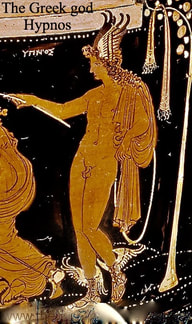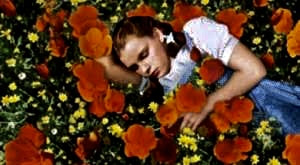 'Alchemy is called the "Hermetic Art", after Hermes, & from a very early date, was linked to a shaman-like knowledge of plant chemicals & heavy metals. The Hermetic Art has been a destabilising threat to harmonious government. A 1906 edition of Webster's International Dictionary gives the etymology of the word Alchemy, associating it with a Greek word for juice or liquid; especially as extracted from plants … for chemistry was originally the art for extracting juices from plants for medicinal purposes. The Arab name Al-Kamia, from which Alchemy is generally thought to be derived, itself has been variously translated to mean "black earth" (an epithet for her opium & for Bengal, or Company opium in India) or to mean "plant extract" (e.g., poppy sap). In those countries where opium poppies were native, or where "black tar" opium was imported, the opium poppy was a principle "magic" plant with many applications.' - 'Opium Traders & Their Worlds' (2008) by Mary L. Klienholz. 'Cruel, to tear or mar The chaliced nenuphar; Cruel to press The rosebud; cruel to scar Or stain the flower-star ' Wrote Aleister Crowley in his poem 'Red Poppy' in 1906. 'In ancient Greece Poppies were considered sacred to Hypnos, the God of sleep. Ancient imagery often depicts Hypnos with Poppy heads in his hands & adorning his head. The doorway to his drowsy realm was also surrounded with Poppies. He brought prophetic dreams & soothed the pain of those suffering from emotional agony. The Romans knew this God as Somnus, a name which still echoes in Poppy's Latin name 'Papaver somniferum' - somnus ferre - bringer of sleep. But Poppy was also associated with Thanatos, or Hades the Lord of Dead & of eternal sleep, for it can also bring death. Such myths reveal Poppy as a plant of the Underworld, associated with both temporal & eternal sleep. Indeed, some archaeological finds at ancient burial sites confirm Poppy's status as a sacred plant that was intimately connected with the rites of passage to the Underworld.' - b-and-t-world-seeds.com 'In the Mysteries of the Ancients, the poppy was the symbol of regeneration. The somniferous qualities of the plant expressed the idea of quiescence; but the seeds of a new existence which it contained were thought to show that nature, though her powers were suspended, yet possessed the capability of being called into a renewed existence. Thus the poppy planted near a grave symbolized the idea of a resurrection. Hence, it conveyed the same symbolism as the evergreen or sprig of acacia does in the Masonic mysteries.' - Mackey's Encyclopaedia of Freemasonry (1873) Above, 'Morph-eus' 'In 1839 Chinese customs officials seized a shipment of opium that British merchants were planning to market in the seaport city of Canton. In response, Britain rejected the legitimacy of China’s opium ban & threatened to use military force if the confiscated opium was not returned to its British owners. When China refused, the British navy shelled Canton & occupied the coastal areas around it, including Hong Kong. The war continued until China was forced to accept the humiliating terms of the 1842 Treaty of Nanking & compensate British merchants for their lost opium. The opium trade continued & even expanded under the generous import-license privileges that the Treaty of Nanking had granted to British merchants. This first of the so-called “unequal treaties” with China also ceded Hong Kong to Britain, opened five coastal cities, including Canton, to British rights of residence & trade, & imposed a very low tariff on British imports under the “most-favored-nation” principle. In 1844 the French & the Americans pressured China into granting them the same trading rights as the British.The second Opium War (1856–1860) is sometimes called the “Arrow War” because the British, incensed by what they felt were clear treaty violations, used as a pretext to renew hostilities the boarding & seizure of the British ship Arrow & the arrest of its twelve crew members for opium smuggling & piracy. This time France joined the British in launching a punitive expedition inland after an initial British attack had been repelled by the Chinese. A combined Anglo-French military raid into China’s hinterland led to the signing of the 1858 Treaty of Tientsin. The Chinese imperial court refused to accept the onerous terms of this second “unequal treaty” until another joint Anglo-French expedition captured the capital Peking in 1860 & forced China’s total surrender. The Treaty of Tientsin allowed foreign embassies in Peking, a closed city at that time, opened eleven more coastal cities to foreign trading, & completely legitimized the opium trade. It also allowed westerners to travel in the Chinese interior, gave Christian missionaries the right to proselytize & hold property throughout China, & lowered even further import duties on British goods. In 1860 similarly imposed treaties were signed with France, the United States, & Russia. The Opium Wars marked the beginning of China’s century-long subjugation & servitude to foreign powers. The defeated Chinese were forced to legalize the importation of opium, accept unfair & unbalanced terms of foreign trade, open up China’s seaports & the Yangtze River to foreign commercial penetration under the so-called “treaty port” system, & exempt westerners from China’s local laws & national jurisdiction. So severely curtailed was China’s independence in that period that the Chinese still view the Opium Wars as a national disgrace.' - http://www.encyclopedia.com/history/asia-and-africa/south-asian-history/opium-wars 'pharmacy (n.) late 14c., "a medicine," from Old French farmacie "a purgative" (13c.), from Medieval Latin pharmacia, from Greek pharmakeia "use of drugs, medicines, potions, or spells; poisoning, witchcraft; remedy, cure," from pharmakeus (fem. pharmakis) "preparer of drugs, poisoner, sorcerer" from pharmakon "drug, poison, philter, charm, spell, enchantment." Meaning "use or administration of drugs" is attested from c. 1400; that of "place where drugs are prepared & dispensed" is first recorded 1833. The ph- was restored 16c. in French, 17c. in English (see ph).' - https://www.etymonline.com/word/pharmacy (See also - https://youtu.be/GIg8wENJTFM) 'for thy merchants were the great men of the earth; for by thy sorceries were all nations deceived.' - Revelations 18:23 (King James Bible) 'Magickal Uses for Poppy Poppy is considered feminine in action & resonates to the energy of the moon & the element of water. It is suitable for any rituals involving Hypnos, Thanatos, Somnus, Nyx, Demeter, Persephone & for offerings to the dead, particularly those who died in battle. Poppies are considered useful in spells for fertility, agriculture, abundance, love, sleep, money, luck & invisibility.' - http://www.witchipedia.com/herb:poppy
0 Comments
Leave a Reply. |

|
|

